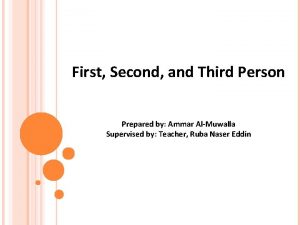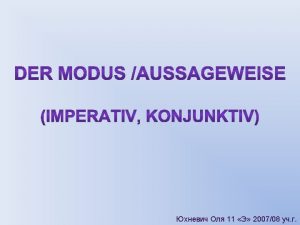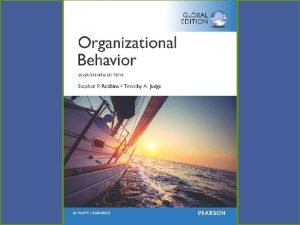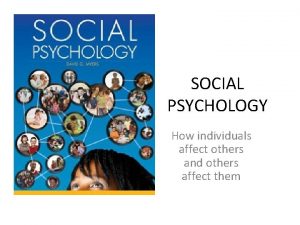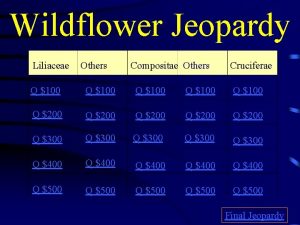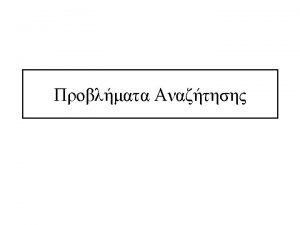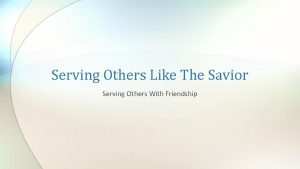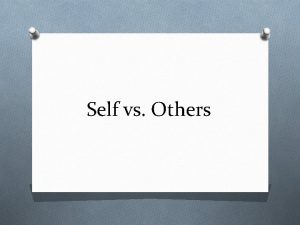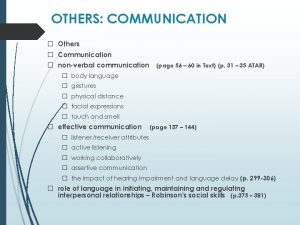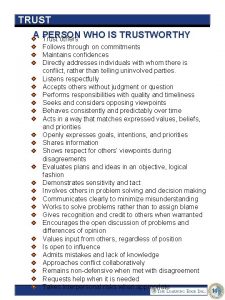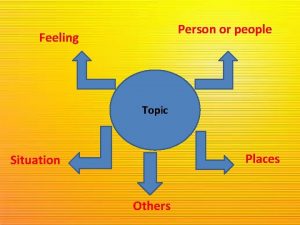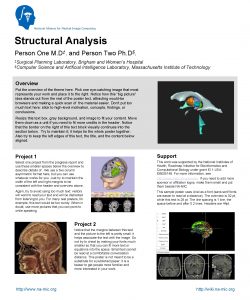THE PERSON AND OTHERS THE PERSON AND OTHERS
































- Slides: 32

THE PERSON AND OTHERS

THE PERSON AND OTHERS Human as a social being has natural and universal tendency to relate, to establish attachments, and seek close relationship with other people. Our moods seem to be always swinging between how the we (SELF) relate with OTHERS and others to the SELF.

The interaction between the SELF and OTHERS is related to the philosophical concept of INTERSUBJECTIVITY – shared awareness and understanding among persons.

In the course of this lesson we will try to find some of the basic answers to the questions: § Why do I have to understand my SELF? § Why am I even born? § What is the meaning of my life, my existence? § Must I have to relate with others? § Do I have to care about the people around me? § Can’t I live alone and create meaning for my own existence?

PHILOSOPHICAL DISCUSSIONS ON THE CONCEPT OF INTERPERSONAL RELATIONS

1. EXISTENTIALISM A complex philosophy emphasizing the existence of the human being, the lack of meaning and purpose in life, and the solitude of human existence…

Two Different Types of Existentialists Godly (Kierkegaard; Marcel and Maritain (Catholic); Tillich and Berdyaev (Protestant) and Buber (Jewish)) Believe God exists, but people are alienated from Him. Man is alienated from his God-like self, and the problem of his life is trying to close that gap freedom involves accepting the responsibility for choice and committing to the choice Ungodly (Sartre and Camus) Do not believe God exists. “Because there is no God to give purpose to the universe, each man must accept individual responsibility for his own becoming. ” In choosing for himself, he chooses for all men “the image of man as he ought to be. ” He has to make good choices that others could follow

Big Ideas of Existentialism Despite encompassing a huge range of philosophical, religious, and political ideologies, the underlying concepts of existentialism are simple…

Cogito ergo sum. Existence Precedes Essence “Existence precedes essence” implies that the human being has no essence (no essential self).

Cogito ergo sum.


Existence Before Essence People are born like a blank slate and create their essence or being through their unique experiences.

Jean Paul Sartre

“Everyone is destined to be somebody. ”


So what then is the meaning of life?

§ In simpler terms, existentialism is a philosophy concerned with finding the SELF and the meaning of life through free will, choice, and personal responsibility. § The belief is that people are searching to find out who and what they are throughout life as they make choices based on their experiences, beliefs, and outlook. And personal choices become unique without the necessity of an objective form of truth. § An existentialist believes that a person should be forced to choose and be responsible without the help of laws, ethnic rules, or traditions.

§ The danger lying under the promise of absolute freedom and individuality without a clearer glimpse of the universal responsibility and the deeper understanding of accountability is the total annihilation of humanity itself. § Man who starts crying for individuality and freedom is now deviating from the main line of morality.

“At the end of the middle age dawns the neo idealism that most of humanity is incapable of handling – the cry for individuality and freedom. This constant cry for freedom and of individuality gives rise to the potential destruction, not only in man himself, but the whole of humanity. Freedom, for all its distorted meanings’ implications, gives birth to the tragedy of the SELF. It gives him reason to separate himself from the rest of the community, to make his own essence, and his alone. Thus, contradicting the very nature of man itself – esse est co-esse, ‘to exist is to co-exist. ’

No man lives alone even from the very beginning. To try to separate himself and build a gap within himself and others will surely bring anxieties in man’s life. Although, these anxieties may have been the conditions of his life, as innate nature, the new trend of idealism (nihilism) brings these anxieties into their worst state. It is in this manner that man does not only butcher a human being, or a ‘brother killing only his brother, ’ as in the book of Genesis. But it is the time when man would commit massacres, leisurely. ” - Ag Serolf, Christian Existentialism In The Literature Of Fyodor Dostoevsky

Major Existential Themes in the Realities of existence

1. Absurdism § The belief nothing can explain or rationalize human existence. § There is no answer to “Why am I? ” § Humans exist in a meaningless, irrational universe and any search for order will bring them into direct conflict with this universe. § Albert Camus, The Myth Of Sisyphus

2. Alienation or Estrangement § From all other humans § From human institutions § From the past § From the future § We only exist right now, right here…

3. Nothingness and Death § Death hangs over all of us. Our awareness of it can bring freedom or anguish. § “Nothingness is our inherent lack of self. We are in constant pursuit of a self. Nothingness is the creative well-spring from which all human possibilities can be realized. ” –Jean-Paul Sartre

4. Freedom: Choice and Commitment § Humans have freedom to choose § Each individual makes choices that create his or her own nature § Because we choose, we must accept risk and responsibility for wherever our commitments take us § “A human being is absolutely free and absolutely responsible. Anguish is the result. ” –Jean-Paul Sartre

5. Dread and Anxiety • Anxiety stems from our understanding and recognition of the total freedom of choice that confronts us every moment, and the individual’s confrontation with nothingness.



Individual vs. History and Mass Culture Modern life has an alienating and dehumanizing effect of man. We live in an age that is becoming more impersonal everyday. If anything, modern man lives the drudgery of Sisyphus in meaningless jobs with mind-numbing repetitions.


Suicide This, for Camus, is the fundamental issue for moral philosophy as it represents the only possible response to the Absurd. In the end, the morally valid response is to continue living. Death Penalty Camus opposes the death penalty in all of his writings. He considered it “the most premeditated of murders” because it causes the victim to suffer his death every day until it happens.

EXISTENTIALISM? To be fully committed to values such as individualism, free choice, inner strength, authenticity, personal RESPONSIBILITY, and self determination. To be willing to live with/by the other and make meaning collectively.
 1st second and third person
1st second and third person Singular 1. person
Singular 1. person Person person = new person()
Person person = new person() First second and third person
First second and third person Person to others
Person to others Person-job fit and person-organization fit
Person-job fit and person-organization fit Person a and person b
Person a and person b Hình ảnh bộ gõ cơ thể búng tay
Hình ảnh bộ gõ cơ thể búng tay Ng-html
Ng-html Bổ thể
Bổ thể Tỉ lệ cơ thể trẻ em
Tỉ lệ cơ thể trẻ em Chó sói
Chó sói Tư thế worm breton là gì
Tư thế worm breton là gì Hát lên người ơi
Hát lên người ơi Môn thể thao bắt đầu bằng từ đua
Môn thể thao bắt đầu bằng từ đua Thế nào là hệ số cao nhất
Thế nào là hệ số cao nhất Các châu lục và đại dương trên thế giới
Các châu lục và đại dương trên thế giới Công của trọng lực
Công của trọng lực Trời xanh đây là của chúng ta thể thơ
Trời xanh đây là của chúng ta thể thơ Mật thư tọa độ 5x5
Mật thư tọa độ 5x5 101012 bằng
101012 bằng Phản ứng thế ankan
Phản ứng thế ankan Các châu lục và đại dương trên thế giới
Các châu lục và đại dương trên thế giới Thể thơ truyền thống
Thể thơ truyền thống Quá trình desamine hóa có thể tạo ra
Quá trình desamine hóa có thể tạo ra Một số thể thơ truyền thống
Một số thể thơ truyền thống Cái miệng xinh xinh thế chỉ nói điều hay thôi
Cái miệng xinh xinh thế chỉ nói điều hay thôi Vẽ hình chiếu vuông góc của vật thể sau
Vẽ hình chiếu vuông góc của vật thể sau Biện pháp chống mỏi cơ
Biện pháp chống mỏi cơ đặc điểm cơ thể của người tối cổ
đặc điểm cơ thể của người tối cổ V cc cc
V cc cc Vẽ hình chiếu đứng bằng cạnh của vật thể
Vẽ hình chiếu đứng bằng cạnh của vật thể Fecboak
Fecboak
